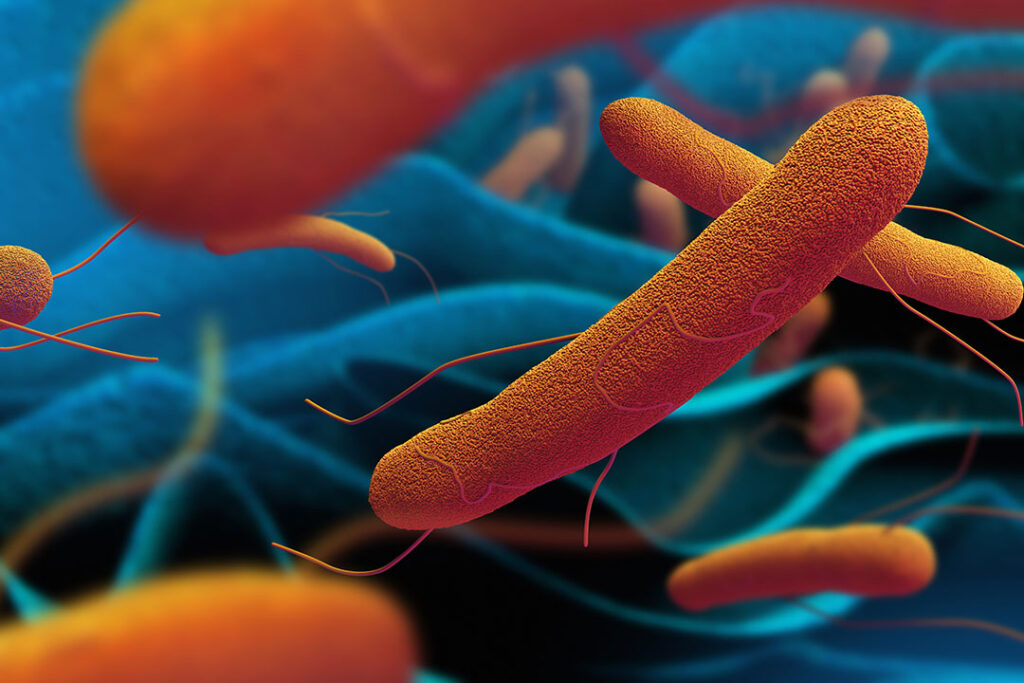Complications of Typhoid Fever
Damage to the intestines
Typhoid fever complications can include damage and bleeding in the intestines. Typhoid fever also can cause cells in the walls of the small intestine or large bowel to die off. This allows the contents of the gut to leak into the body. That can cause severe stomach pain, vomiting, and infection throughout the body called sepsis.
Damage to the intestines can develop in the later part of the illness. These life-threatening complications require immediate medical care.
Other possible complications include:
- Inflammation of the heart muscle, called myocarditis.
- Inflammation of the lining of the heart and valves is called endocarditis.
- Infection of major blood vessels called mycotic aneurysm.
- Pneumonia.
- Inflammation of the pancreas, called pancreatitis.
- Kidney or bladder infections.
- Infection and inflammation of the membranes and fluid surrounding the brain and spinal cord are called meningitis.
- Psychiatric problems, such as delirium, hallucinations, and paranoid psychosis.
Prevention of Typhoid Fever
People can get a vaccination against typhoid fever. This is an option if you live where typhoid fever is common. It is also an option if you plan to travel to a place where the risk is high.
Where typhoid fever is common, access to treated water helps avoid contact with the Salmonella enterica serotype typhi bacteria. Management of human waste also helps people avoid bacteria. And careful hand-washing for people who prepare and serve food is also important.
Because the vaccine won’t provide complete protection, follow these guidelines when traveling to high-risk areas:
- Wash your hands. Frequent hand-washing in hot, soapy water is the best way to control infection. Wash before eating or preparing food and after using the toilet. Carry an alcohol-based hand sanitizer for times when soap and water aren’t available.
- Avoid using untreated water. Contaminated drinking water is a problem in areas where typhoid fever is common. For that reason, drink only bottled water or canned or bottled carbonated beverages, wine, and beer. Carbonated bottled water is safer than noncarbonated bottled water. Ask for drinks without ice. Use bottled water to brush your teeth, and try not to swallow water in the shower.
- Avoid raw fruits and vegetables. Because raw produce may have been washed in contaminated water, avoid fruits and vegetables that you can’t peel, especially lettuce. To be safe, you may want to avoid raw foods.
- Choose hot foods. Avoid food that’s stored or served at room temperature. Freshly made, steaming hot foods may be less risky than uncooked foods.
- Know where the health care providers are. Find out about medical care in the areas you’ll visit. Carry a list of the names, addresses, and phone numbers of healthcare providers.
Prevent infecting others
If you’re recovering from typhoid fever, these measures can help keep others safe:
- Take your antibiotics. Follow your health care provider’s instructions for taking your antibiotics and be sure to finish the entire prescription.
- Wash your hands often. This is the single most important thing you can do to keep from spreading the infection to others. Use hot, soapy water and scrub thoroughly for at least 30 seconds, especially before eating and after using the toilet.
- Avoid handling food. Avoid preparing food for others until your healthcare provider says you’re no longer contagious. If you work with food, you may need to take a test to show you aren’t shedding typhoid bacteria. If you work in health care, you also may need to show you aren’t shedding the bacteria.


